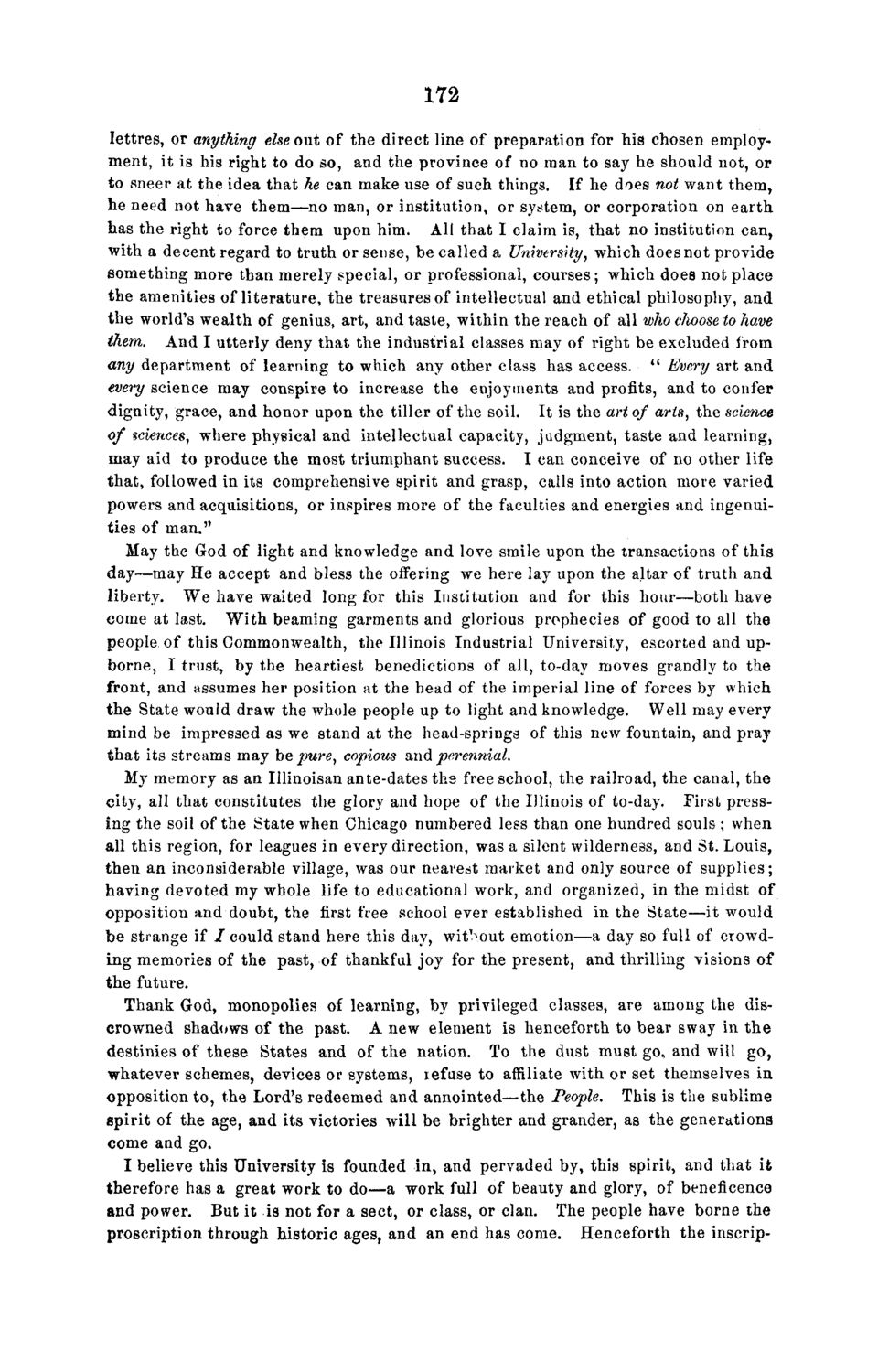| |
| |
Caption: Board of Trustees Minutes - 1868
This is a reduced-resolution page image for fast online browsing.

EXTRACTED TEXT FROM PAGE:
172 lettres, or anything else out of the direct line of preparation for his chosen employment, it is his right to do so, and the province of no man to say he should not, or to sneer at the idea that he can make use of such things. If he does not want them, he need not have them—no man, or institution, or system, or corporation on earth has the right to force them upon him. All that I claim is, that no institution can, with a decent regard to truth or sense, be called a University, which does not provide something more than merely special, or professional, courses; which does not place the amenities of literature, the treasures of intellectual and ethical philosophy, and the world's wealth of genius, art, and taste, within the reach of all who choose to have them. And I utterly deny that the industrial classes may of right be excluded from any department of learning to which any other class has access. " Every art and every science may conspire to increase the enjoyments and profits, and to confer dignity, grace, and honor upon the tiller of the soil. It is the art of arts, the science of sciences, where physical and intellectual capacity, judgment, taste and learning, may aid to produce the most triumphant success. I can conceive of no other life that, followed in its comprehensive spirit and grasp, calls into action more varied powers and acquisitions, or inspires more of the faculties and energies and ingenuities of man." May the God of light and knowledge and love smile upon the transactions of this day—may He accept and bless the offering we here lay upon the altar of truth and liberty. We have waited long for this Institution and for this hour—both have come at last. With beaming garments and glorious prophecies of good to all the people of this Commonwealth, the Illinois Industrial University, escorted and upborne, I trust, by the heartiest benedictions of all, to-day moves grandly to the front, and assumes her position at the head of the imperial line of forces by which the State would draw the whole people up to light and knowledge. Well may every mind be impressed as we stand at the head-springs of this new fountain, and pray that its streams may be pure, copious and perennial. My memory as an Illinoisan ante-dates the free school, the railroad, the canal, the city, all that constitutes the glory and hope of the Illinois of to-day. First pressing the soil of the State when Chicago numbered less than one hundred souls ; when all this region, for leagues in every direction, was a silent wilderness, and St. Louis, then an inconsiderable village, was our nearest market and only source of supplies; having devoted my whole life to educational work, and organized, in the midst of opposition and doubt, the first free school ever established in the State—it would be strange if / c o u l d stand here this day, wit'^out emotion—a day so full of crowding memories of the past, of thankful joy for the present, and thrilling visions of the future. Thank God, monopolies of learning, by privileged classes, are among the discrowned shadows of the past. A new element is henceforth to bear sway in the destinies of these States and of the nation. To the dust must go, and will go, whatever schemes, devices or systems, refuse to affiliate with or set themselves in opposition to, the Lord's redeemed and annointed—the People. This is the sublime spirit of the age, and its victories will be brighter and grander, as the generations come and go. I believe this University is founded in, and pervaded by, this spirit, and that it therefore has a great work to do—a work full of beauty and glory, of beneficence and power. But it is not for a sect, or class, or clan. The people have borne the proscription through historic ages, and an end has come. Henceforth the inscrip-
| |